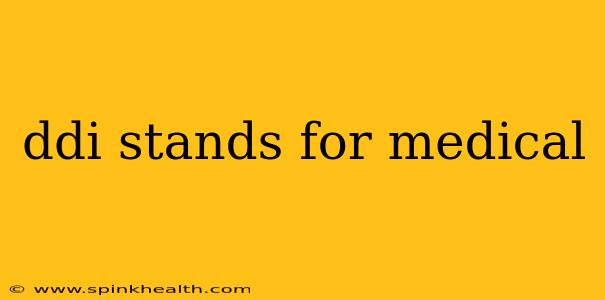Decoding DDI: What Does It Mean in the Medical World?
The abbreviation "DDI" might seem cryptic at first glance, especially within the complex landscape of medical terminology. But fear not! This seemingly simple acronym actually carries significant weight in the world of drug interactions, influencing patient safety and treatment efficacy. Let's unravel the mystery behind DDI and explore its importance in healthcare.
DDI stands for Drug-Drug Interaction. It's a term used to describe the impact one medication can have on another when taken concurrently. These interactions can range from minor inconveniences to life-threatening complications. Understanding DDIs is crucial for healthcare professionals and, increasingly, for patients themselves, as managing multiple medications has become commonplace.
Imagine this: you're prescribed two medications—one for high blood pressure and another for allergies. Unbeknownst to you, these two drugs might interact in a way that either reduces the effectiveness of one or both, or even triggers adverse side effects. This is precisely where the importance of recognizing and managing DDIs comes into play.
What Types of Drug-Drug Interactions Exist?
Drug-drug interactions manifest in various ways, broadly classified as:
-
Pharmacokinetic Interactions: These alter the absorption, distribution, metabolism, or excretion of a drug, affecting its concentration in the body. For example, one drug might accelerate the breakdown of another, leading to reduced efficacy.
-
Pharmacodynamic Interactions: These involve interactions at the site of drug action. For instance, two drugs might compete for the same receptor site, negating or enhancing each other's effects. This can lead to either increased efficacy or unwanted side effects.
How Can Drug-Drug Interactions Be Detected and Managed?
Identifying potential DDIs requires careful attention to detail. Pharmacists play a vital role in screening prescriptions for potential conflicts and alerting healthcare providers. Several tools and databases are available to assist in this process, utilizing complex algorithms to analyze potential interactions between drugs.
The management of DDIs involves several strategies:
-
Adjusting dosages: Sometimes, the dosage of one or both medications can be modified to mitigate the interaction.
-
Switching medications: In certain cases, replacing one drug with an alternative that doesn't interact negatively might be necessary.
-
Adjusting timing of administration: Separating the administration times of interacting drugs can sometimes minimize their effects on each other.
-
Close monitoring: Careful monitoring of the patient for any adverse effects is crucial, especially when known interactions exist.
What Are Some Common Examples of Drug-Drug Interactions?
Many common medications can interact, highlighting the importance of comprehensive medication reviews. Examples include interactions between certain antibiotics and birth control pills, where the antibiotic can reduce the effectiveness of the contraceptive. Similarly, some medications used to treat heart conditions can interact negatively with certain allergy medications. It’s important to note that this is not an exhaustive list, and many other interactions can occur.
How Can I Learn More About Potential Drug Interactions?
It is crucial to be proactive about your medications.
-
Talk to your doctor or pharmacist: They are the best resources for information regarding your specific medications and potential interactions.
-
Keep a detailed list of your medications: Include all prescription, over-the-counter, and herbal remedies.
Understanding DDIs is crucial for patient safety and treatment success. By being informed and communicating openly with your healthcare providers, you can actively participate in mitigating the risks associated with these potentially significant interactions. Remember, proactive communication is key to managing your health effectively.

